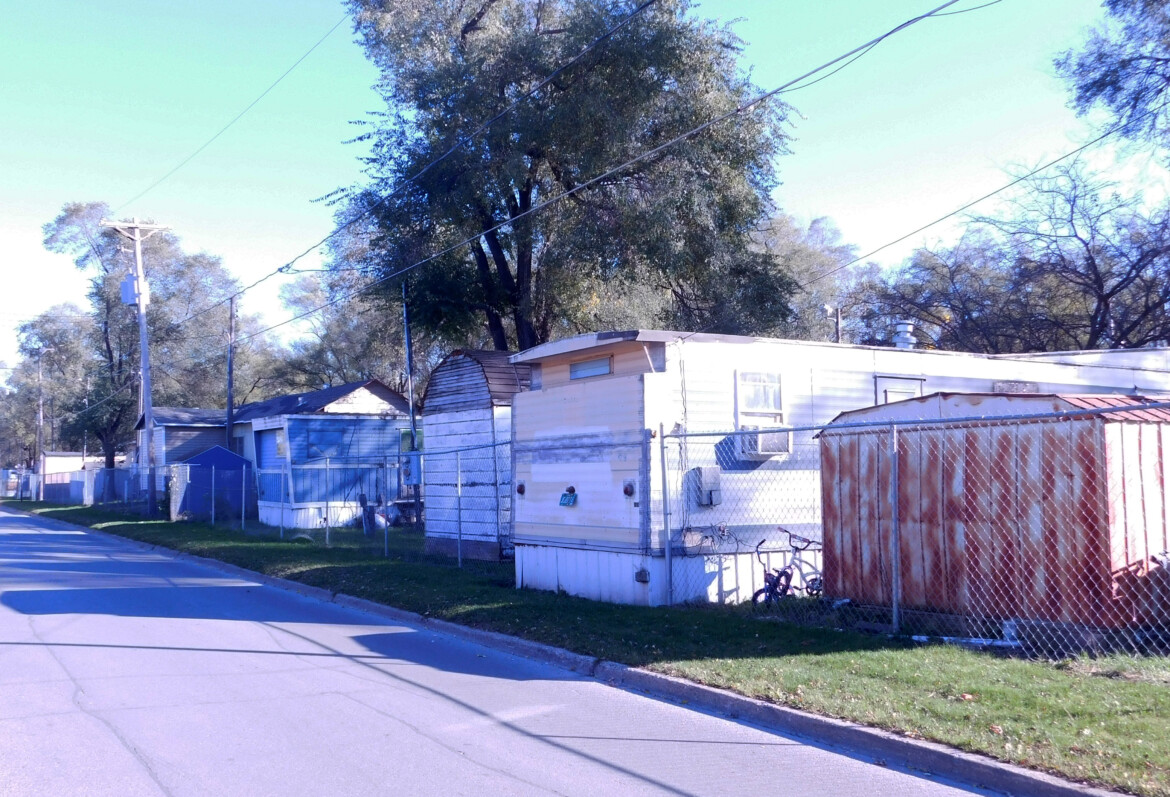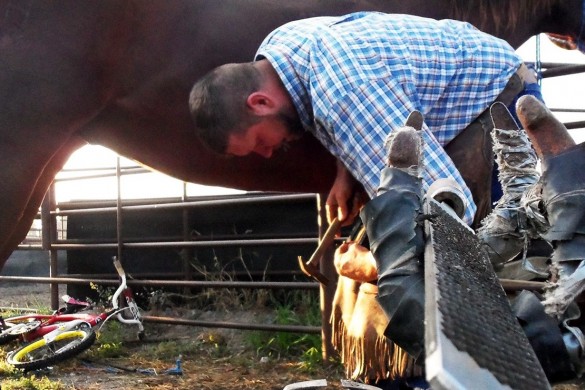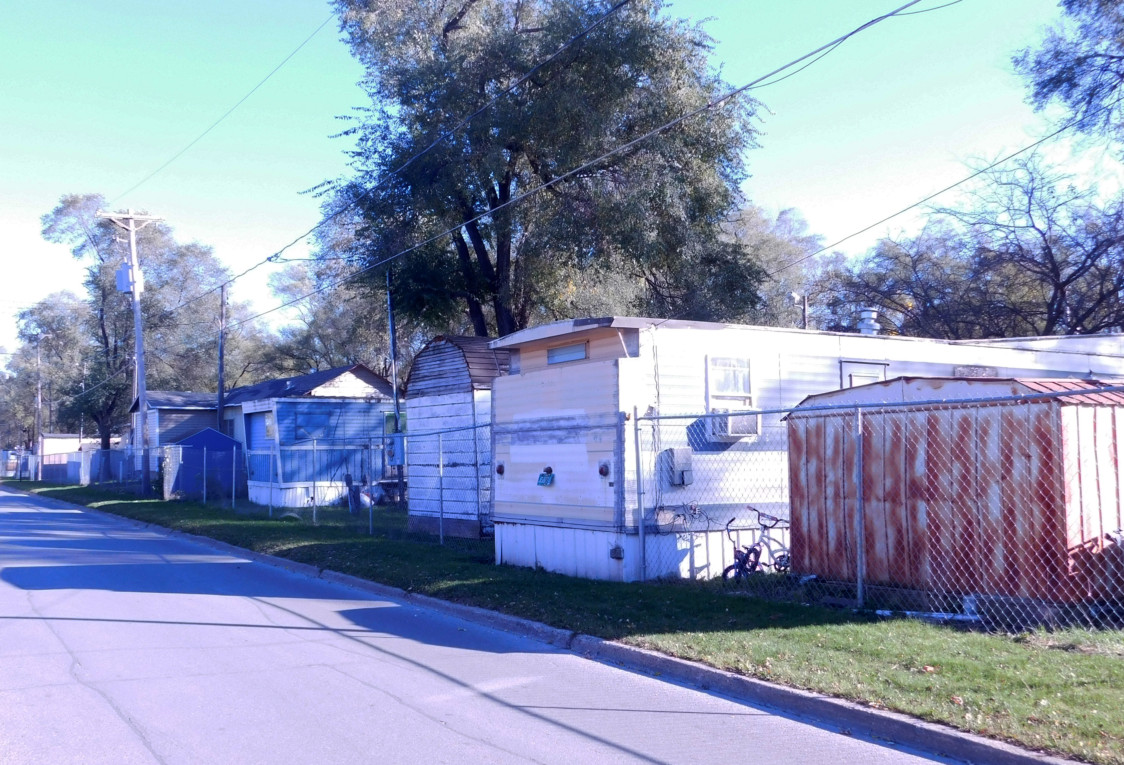
Demographics of mobile home parks are shifting. Residents of Radio City Mobile Home Park in Des Moines, Iowa, consist primarily of young families.
Lowest in glamour, highest in value: This is the manufactured housing industry
Words by Melissa Studach
Photos by Melissa Studach and Emily VanSchmus
Graphics by Emily VanSchmus
It’s easy to get lost trying to navigate a mobile home park. One wrong turn and you’re in the same place you started. Yet from an aerial glance, the 330 lots of Sugar Creek Estates Mobile Home Park form a meticulous grid nestled in the hills of Fenton, Missouri, a small southwest suburb of St. Louis.
What you won’t see from an aerial view, though, is the plastic Little Tikes car sitting in a resident’s front yard. Or the marigolds blossoming in another’s lot. Or the heavy-set man working on his Chevy truck. He’ll wipe a grease-stained hand across his red, cut-off T-shirt before pointing you in the right direction.
“This isn’t what you’d expect if you’ve seen Cops or Eight Mile,” said park owner Frank Rolfe. “But that kind of classic trailer park—rebel flag in the window, Harley Davidson in the driveway, toothless hillbilly guy—that’s not the bulk of the industry. This is the bulk.”
Rolfe admits his original expectations were no different. But after falling into the park ownership role in his mid-30s, he readjusted his view. He, along with several other industry experts, is making it his mission to change the industry’s reputation.
An Industry on the Move
Mobile homes are woven into the fabric of American history. As automobiles rose to popularity in the 1920s, travelers wanted an alternative to motels. Travel trailers, or campers, unfolded from a vehicle hitch like an accordion. By the time World War II ended, the transportable housing developed into more sufficient, year-round units, earning the title mobile homes. Demand spiked as GIs returned home looking for an affordable alternative to Levittowns, the cookie-cutter suburban communities created for veterans.
Today’s manufactured homes have evolved from their hybrid ancestors. Congress passed the National Manufactured Housing Construction and Safety Act in 1974, which once again renamed the residence, to establish a manufacturing standard. By definition, manufactured homes are built wall-by-wall in an indoor, climate-controlled setting, sold through retailers and constructed on-site by installation professionals.
“A factory-built home is actually better quality than a lot of your stick-built homes today because they’re built in controlled environmental conditions instead of in the weather subject to the elements,” said Darryl Searer, president of the RV/Manufactured Home Hall of Fame.
The RV/MH Hall of Fame is located in Elkhart, Indiana, and is recognized as the birthplace of manufactured housing and continues to headquarter several manufacturers today. It welcomes more than 20,000 visitors a year to experience the industry’s history through a museum, library, theater and a 2013-built manufactured home open for tours.
“The first question our volunteers ask guests is what RV and MH stand for,” Searer said. “And you know what 99 out of 100 say? Motor home, not manufactured housing. The RV side has dominated over the manufactured housing side, so we educate those people correctly [on how far the mobile home industry has [come].”
Operating Wheel Estate
Rolfe never intended to be one of the largest mobile home park owners in the U.S. After ending a successful, yet short-lived career in billboard advertising, Rolfe was 35 years old without any career paths in mind.
“I started calling people who I had built billboards on their property with things I could do,” Rolfe said. “I called up a guy who had a mobile home park, and he said, ‘If you really want to know about my business, I’ll make you a deal you can’t refuse.’”
Rolfe purchased his first park from the man, which ended up being an operational disaster. Yet even behind the necessary physical repairs and management updates, he was able to find potential.
“The more I got into [the industry] and researched it, I realized you can’t even build these things anymore,” he said. “And since I was an economics major at Stanford, it was supply and demand. If there’s no supply, then things go up in value.”
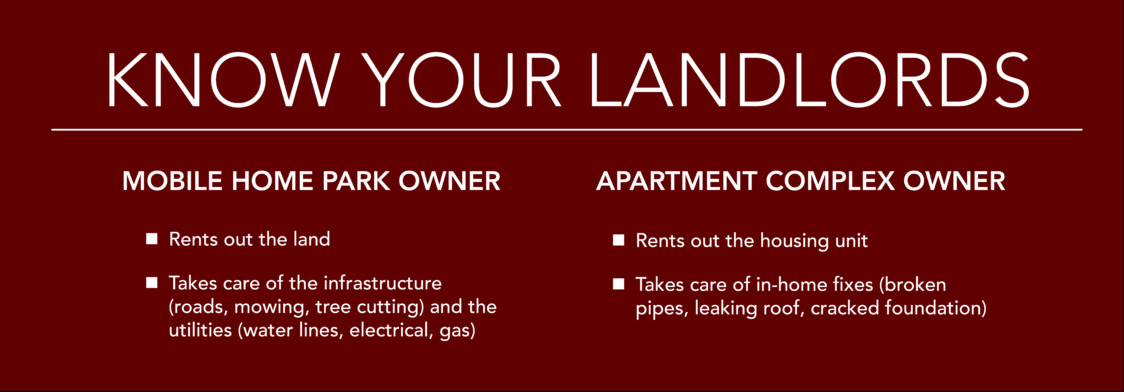
His predictions proved right. After promoting his first park in a local newspaper, he received nearly 80 calls a week. “I had never seen that much demand in my life,” he said. “With billboards, I’d have to make 100 sales calls to sell one board. With the park, I had people hounding me and coming to the office saying they’d take anything I had.”
Price has a lot to do with the demand. The average manufactured home costs around $60,000, compared to a stick-built home’s average price of $206,560. The industry holds 6.7 percent of the nation’s real estate market, housing about 22 million residents.
Now, more than 20 years since purchasing his first community, Rolfe co-owns the fifth-largest mobile home park portfolio in the U.S., with 230 of his properties in the Midwest. He cites location as one of his biggest keys to success.
Everything we buy has a problem. We figure out what the problem is, then we solve it. Once it’s solved, you never go back to that mode.”
-Frank Rolfe
To have affordable housing you must also have expensive housing, he notes. Take Sugar Creek Park in Fenton, for example. With median housing costs at $125,000 and apartments renting at $1,000 a month, there’s a lack of affordable housing in the St. Louis suburb.
“People want to live here,” Rolfe said. “There’s a great school district, nice area—just no affordable housing. We’re one of the few ways you can, so it’s crazy not to be filling vacant lots.”
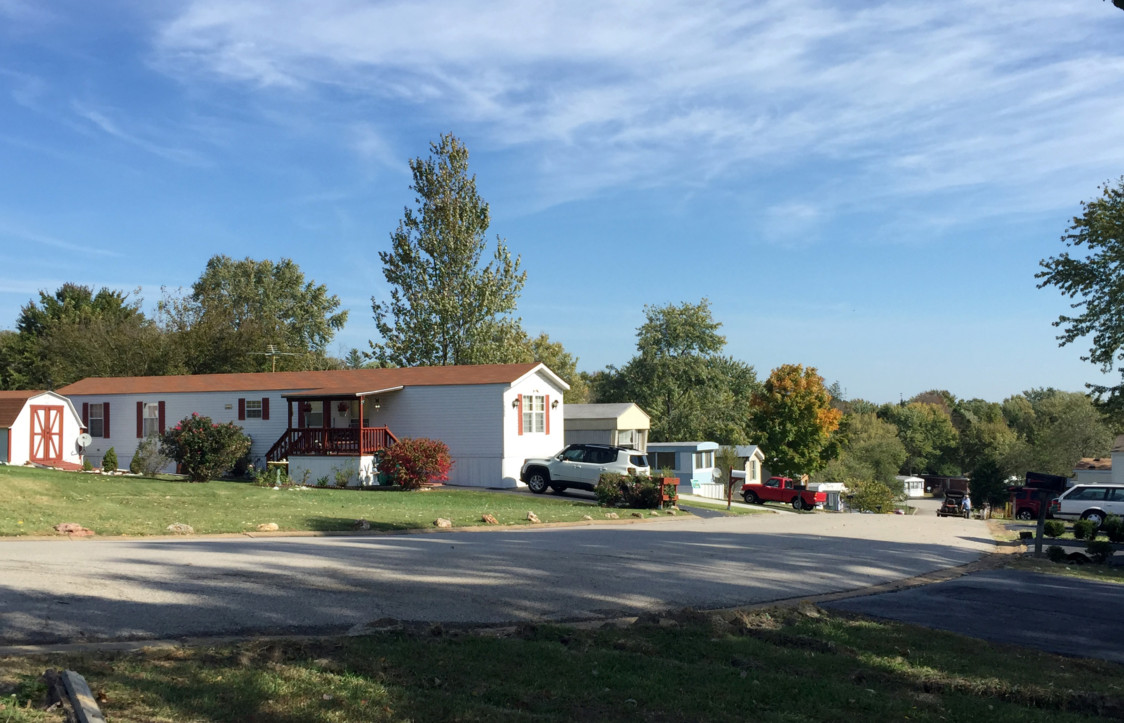
Sugar Creek Park is nestled in the hills of Fenton, Missouri.
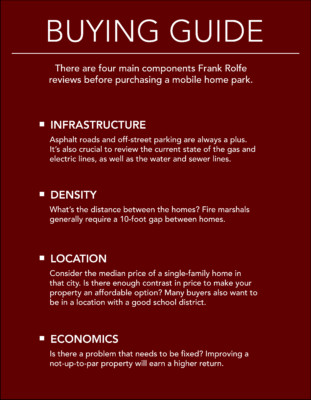
Rolfe is no longer a scrappy college kid, surprised by demand. He’s worked the system. He knows his industry. He owns a bouged-out Range Rover.
He’s used his two decades’ worth of industry knowledge to create Mobile Home University, a three-day boot camp educating interested investors about the manufactured housing industry. The densely informative course, as described by online reviews, has garnered Rolfe quite the fan club.
He admits running Mobile Home University is a fun hobby. “You can never go to a school PTA meeting and find another adult who’s been in the mobile home park industry [so our program acts as a forum].”
Changing Perspectives
When Jessica Buike and her husband Christopher were looking to move in 2013, they too stumbled into the manufactured housing industry. The young couple had been living in a 60-year-old, single-family home in Bellevue, Nebraska, that continuously needed to be renovated. He wanted to be closer to his work in Omaha. She wanted to downsize so they could travel more.
It’s definitely about living simpler. The less home to take care of, the more you can enjoy things.”
-Jessica Buike
They toured apartments, condos and townhomes in the Omaha area. Buike admits they were skeptical of manufactured home stigmas, but decided to look around Meadowbrook Estates anyway. After one visit, they were sold. They purchased a brand new manufactured home and had it moved into the community.
“People thought we were crazy,” Buike said. “They thought we’d be sitting around with beer cans in the yard and trash. They didn’t think it could be a nice community.”
Ask a park owner about their typical resident a decade ago, and they’d have likely described a retiree. For many parks, this “geezer” persona and the beer-drinking, gun-slinging Duck Dynasty fan are strongly held stereotypes. But that picture is changing. Buike says her Omaha community is diverse, with residents ranging from college-age to young families to, yes, the classic retiree.
“A lot of people these days are seeing it as a smart option because you get a lot of bang for your buck,” Buike said of her three-bedroom, two-bath home. “And we’re in an expensive part of town that we normally wouldn’t be able to live in.”
Still Work to Be Done
But that classic trailer park perception—the one with the Stars and Bars in the window and the Harley out front—persists for a reason. While improvements continue to be made, not all parks are perfect. Take the Radio City Mobile Park in Des Moines. If there was ever a “before” image to Rolfe’s “after” transformation, this would be it.
Major potholes, tight property lots and tree branches near electrical lines likely explain the amount of empty lots in the park.
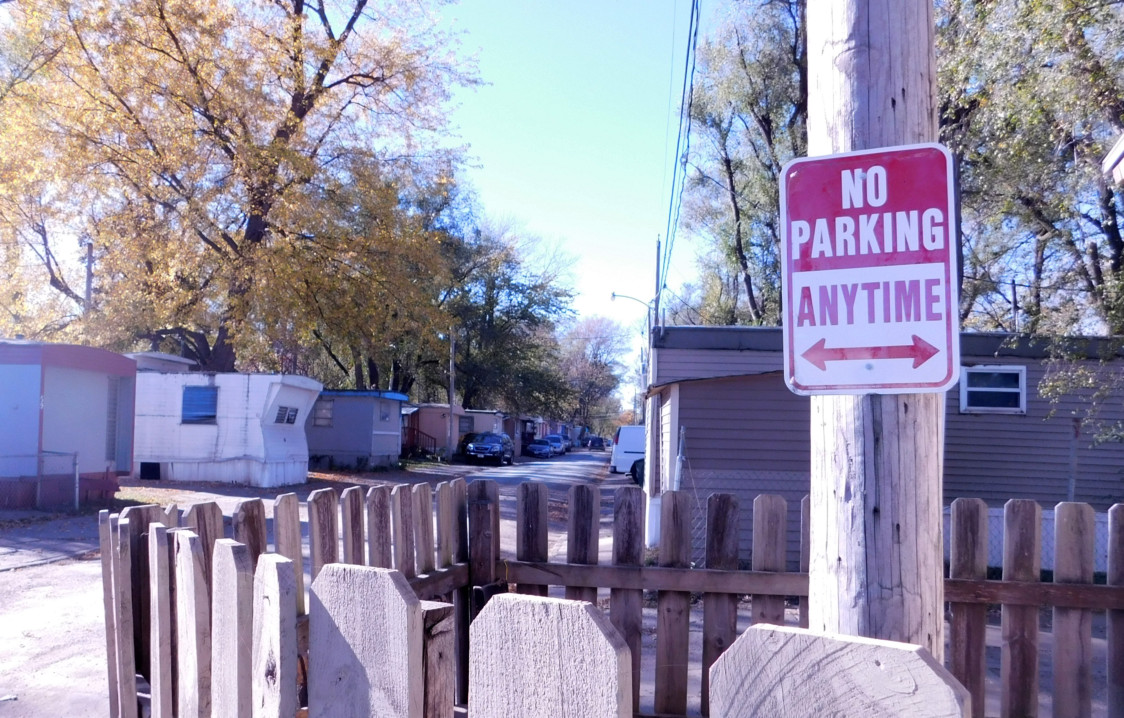
Radio City Mobile Home Park in Des Moines, Iowa, will soon be undergoing property renovations to meet the new manufactured housing standards.
“Everything is in violation because the park is really old,” said Leticia Espinoza, who has been the park’s office manager for two years. “We’re working with the city to bring it up to date.”
Residents are willing to wait. But with transporting mobile homes costing up to $15,000, many don’t have a choice. After all, a small increase in rent seems less intimidating than that price tag. And with renovations in the works, an increase in rent is almost a guarantee.
“Sometimes we get criticized on raising rents, but people don’t realize that if you don’t raise rents, you can’t offer a good product,” Rolfe said. “If the water doesn’t run very well, or there are potholes the size of a Volkswagen Beetle, most people are willing to pay a little more not to have those things. Our goal is to give people a good value.”
If the “after” photos look anything like Fenton’s Sugar Creek Estates, residents may be able to justify the price. But even in the park’s pleasant landscape, Rolfe’s Range Rover still stands out like a, well, Range Rover in a mobile home park.

